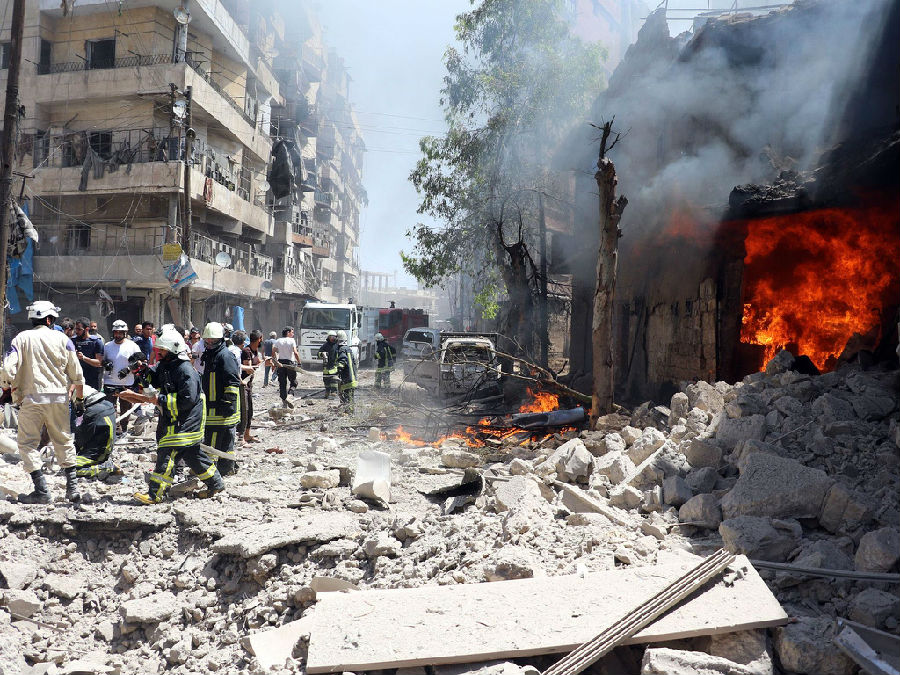Other countries have focused on the fight against terrorism or on the humanitarian relief effort, while the war itself has bled ever more fiercely.
其他國家則將重點放在了打擊恐怖主義,實施人道主義援助上,敘利亞戰爭本身則變得更為血腥了。
Laws prohibiting the killing of civilians, the bombing of hospitals and schools, or mass rape;
在敘利亞戰爭問題上,禁止殺害平民、禁止轟炸醫院及學校,禁止大規模強奸的法律,
treaties banning the use of chemical attacks; the Responsibility to Protect pact, signed by U.N. member states;
禁止使用化學攻擊的條約,聯合國成員國簽署的國家保護責任條約,
the Security Council’s powers to act to stop a conflict–the U.N. Charter itself–all lie broken, unused or misused in the Syrian conflict.
安理會采取行動,制止沖突的權力--也即聯合國憲章本身--不是未被履行,未被利用,就是被濫用。
Since 2014, the U.N. has been unable to count the dead in Syria.
自2014年以來,聯合國一直未能統計出敘利亞的死亡人數。
Some estimate that over half a million Syrians have died.
一些人估計這一人數多達50萬以上。
Politicians often imply that we face a choice between open-ended military and diplomatic interventions of the kind we’ve seen in Iraq and Afghanistan,
政客們經常暗示,我們面前有兩種選擇,一種是采取伊拉克和阿富汗經歷過的那種開放式的軍事和外交干預,
and leaving other countries to fend for themselves,
一種是讓其他國家自食其力,
sending whatever amount of humanitarian aid we’re willing to supply, and sealing ourselves off.
我們只負責管好我們自己,同時提供我們愿意提供的,任何規模的人道主義援助。
Syria is proof that a lack of leadership and diplomacy has consequences.
缺乏領導和外交會帶來怎樣的后果?敘利亞沖突便是一大明證。

It also raises fundamental questions for us as Americans:
這一沖突也引發了我們美國人對一些重大問題的思考:
When did we stop wanting to stand up for the underdog, for the innocent, for those fighting for their human rights?
我們何時才能放棄挺身而出,為失敗者、無辜者以及那些為自己的人權斗爭的人“打抱不平”的沖動?
And what kind of country would we be if we abandoned that principle?
放棄這一原則,我們又會成為一個怎樣的國家?
There is a lot of focus in America today on self-preservation.
如今的美國,大家都非常關注自我保護。
But peace is almost always fought for hardest by those who really understand war.
然而,為爭取和平付出的努力最為艱辛的幾乎往往都是那些真正了解戰爭的人。
History shows that when we fought for the liberation of Europe in World War II, or contributed to building the postwar global order,
歷史表明,二戰期間我們所謂的為解放歐洲而戰,戰后所謂的為建立全球秩序添磚加瓦,
we did so for our own interests–and we reaped the benefits.
實則都是在為我們自己的利益奔走——好處我們可沒少拿。
When America was attacked on 9/11,
美國遭遇9/11襲擊時,
many countries made common cause with us because we had earned their friendship.
不少國家紛紛與我們同仇敵愾,因為我們贏得了他們的友誼。
We’re watching the brutal endgame of the war in Syria as if it has little to do with us.
到了敘利亞戰爭問題上,我們卻選擇了坐視敘利亞戰爭殘酷收尾,好像這場戰爭與我們并沒有什么關系。
But it does.
事實是,關系很大。
We should be using our diplomatic power to insist on a cease-fire
我們應該發揮我們的外交實力,堅持走停火,和平談判的道路,
and a negotiated peace based on at least some measure of political participation, accountability and the conditions for the safe return of refugees.
至少要做一定的政治參與,問責,規定難民安全返回條件工作。
The alternative is that Syria stands as an infamous new reference point for the brutality
否則,敘利亞將成為一個國家
and destruction that it is possible to inflict with impunity upon a civilian population–
可能在不受懲罰的情況下對平民施加的暴行和破壞的新參照點,
and it will fall on the already loaded shoulders of the next generation to rebuild a shattered international system.
屆時,重建已經支離破碎的國際秩序的重任便會落到下一代身上,盡管他們早已不堪重負。
譯文由可可原創,僅供學習交流使用,未經許可請勿轉載。











